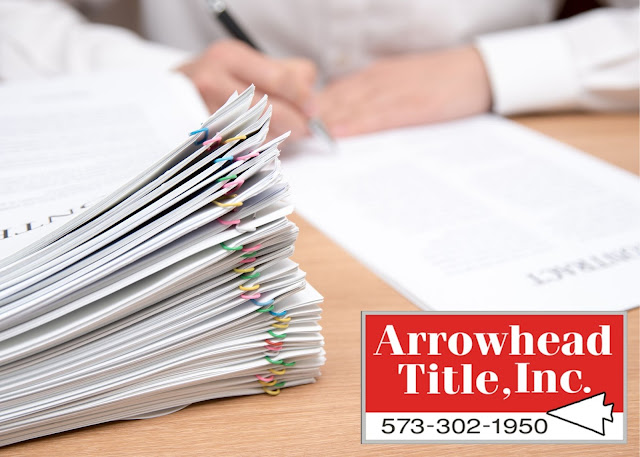Understanding Closing Costs Part 2: What is Your Responsibility?
When buying and selling real estate, there are multiple expenses that must be satisfied in order to complete the transaction. These expenses vary depending on whether you are a buyer or a seller in the transaction. When we talk about the costs of buying real estate at the Lake of the Ozarks, we talk about several different things. The home inspection, home appraisal, and earnest money are just a few examples. The other major expenses are lumped together in a broad category that is simply called "closing costs." Arrowhead Title, Inc. is here to help you get a better understanding of what you need to know about the closing costs you may have to pay when you buy or sell your next home.
What Are Closing Costs?
Closing costs are all the fees and expenses associated with the closing or settlement of a real estate transaction, and they can vary dramatically. In addition, the buyer usually pays many different fees associated with closing costs than the fees the seller must pay in a real estate transaction.What Is Included in the Closing Costs?
It is important to recognize that there are different types of closing costs associated with buying or selling real estate. While the exact closing costs vary from transaction to transaction, below are a few examples of items that are commonly included in the closing costs.The buyer’s closing costs usually include the following:
- Lender Fees – includes the application fee, discount fee, processing and underwriting fee, wire transfers credit report, etc.
- Appraisal – usually required by most lenders and usually paid by the buyer at closing
- Transfer Taxes – these are taxes due to transfer the deed of the property in that location (note that these can be paid by the buyer or seller or split between the two, depending on the circumstance)
- Property Insurance
- Title Fees – typically includes notary fees, title search fees, and title insurance
- Property Tax Reserves
- Homeowners association fees (if applicable)
The dollar amount associated with the closing costs varies, but in general, buyers can expect to pay somewhere between 2.5% and 4% of the sale price. View our blog post from last week for more information about what is included in the closing costs.
Who pays for the Closing Costs?
Traditionally, buyers cover most of the closing costs associated with buying a home. The majority of the seller’s closing costs are comprised of the real estate agent’s commission. However, there are a few options that may offer buyers some assistance with this burden. Specifically, buyers may be able to negotiate with the sellers to have them assist with the closing costs.Ways Sellers Pay for Closing Costs
As the seller, you have the option of contributing to your buyers' closing costs if you so choose. Advertising this offer ahead of time can be a great added incentive and may help you attract additional buyers to your property. If you choose not to advertise this option ahead of time, you can instead offer it to buyers during the negotiation process in order to smooth over various issues that may arise.
Financing Closing Costs into the Mortgage Loan
Be aware that this is not an option with many traditional types of mortgage loans, which typically require substantial down payments of 20-25%. However, it may be a possibility for certain nontraditional alternatives. USDA loans, for example, typically offer buyers an opportunity to purchase a home with a 0% down payment and may allow buyers to factor some or all of their closing costs into the overall loan amount. Talk to your mortgage lender to find out if this may be an option for you.
Seller Closing Costs: What are Sellers Responsible for?
Before sellers agree to assist with the buyers' closing costs, they should be aware of their own closing costs they will be expected to cover. Sellers generally have fewer items to pay than buyers, but that doesn't mean they get off easy. In fact, sellers are responsible for paying sales commissions to both parties' real estate agents, which usually adds up to about 6% of the sales price.Typical closing costs for sellers include:
- Real Estate Commissions
- Property Taxes – if the seller has not already paid property taxes, they are responsible for all taxes up until the closing date
- Past Due Utility Bills
- Any Liens Against the Property
- Transfer Taxes – these are taxes due to transfer the deed of the property in that location (note that these can be paid by the buyer or seller or split between the two, depending on the circumstance)
- Title Fees – include notary fees and fees charged by the title company
In some cases, the buyer will negotiate for the sellers to cover the buyer’s closing costs up to a certain percentage or set dollar amount. The buyer may also negotiate for the sellers to cover additional costs, such as fixing damage that was found in the home inspection, a home warranty premium, or other more specific items. Most, if not all, closing costs are negotiable. Both buyers and sellers may negotiate on who pays which fees. The buyer usually pays more line-item expenses, and the seller usually pays the commission. Your agent can assist you in this negotiation process to find an agreement that satisfies both the buyers' and the sellers' needs.
Trust Arrowhead Title To Facilitate Your Transaction!
When you buy real estate, our Lake of the Ozarks title company will process the entire transaction to ensure that all funds are accounted for and properly distributed. We will also conduct a thorough title search to reveal any potential issues with the title that may need to be resolved prior to closing. If you have questions about our title services at the Lake of the Ozarks, call to learn more about what we can offer you.
Where Accuracy Matters








Comments
Post a Comment